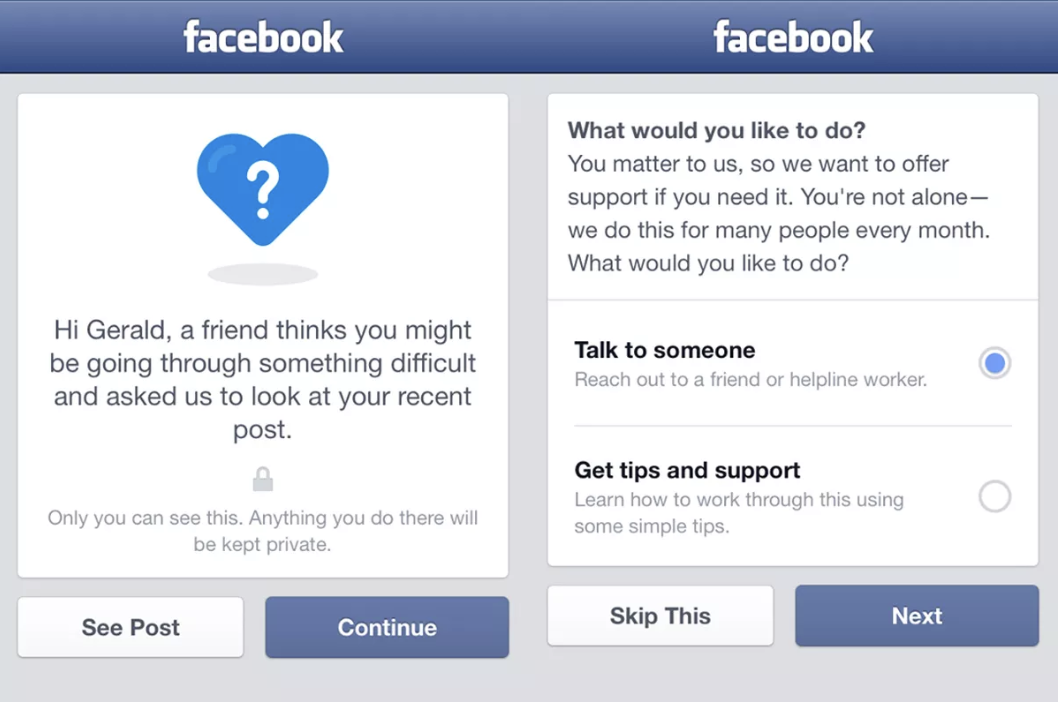According to Brandwatch (2019), Facebook has almost 2.3 billion users worldwide. So, their adoption of a suicide prevention plan is a huge deal. Facebook has become the first social media giant to develop a tool to intentionally address the suicide epidemic. Facebook’s suicide prevention efforts includes over 50 resources all over the world that specifically address suicidal ideation. In addition, Facebook consulted with professionals and survivors of attempted suicides to develop a tool that was both comprehensive and inclusive, providing resources to not only those experiencing suicidal thoughts but friends that are trying to support a person experiencing these thoughts. It is no secret that social media has been used to send final messages, express hopeless emotions and in extreme cases capture the event, and facebook’s technology can aid in saving the lives of countless individuals. Their plan includes the flagging of posts that have language that reflects suicidal thoughts. Once flagged the individual would be contacted and offered resources. This sounds cool right! Now there is a way to really help people who are in crisis.
Facebook’s effort has brought out some concern about privacy. Facebook’s suicide prevention efforts raises red flags due to the lack of informed consent and the way in which data is collected. Researchers believe this could open users up to being utilized for research without their permission. The rules of research dictate that you must gain consent and protect human subjects. Despite the backlash and potential issues with consent, Facebook has taken a huge step in prevention which can have a great impact in preventing suicide. With over 2 billion users, Facebook is very likely to cross paths with someone in crisis through its prevention efforts.
How is this important to the Black community? There is a rise in Black youth suicide which has been noted by researchers. According to Jeffrey Bridge and colleagues out of Ohio State University, the rates of black children ages 5-12 have doubled the rate of white children similar in age. So, Facebook’s efforts are important in spreading awareness and providing resources that people could use for themselves and within their communities. There are some cultural challenges to mental health within the Black community. Facebook’s effort could potentially help overcome challenges of stigma, lack of resources, treatment options, and support.
- Shame and Stigma: It is no secret that mental health is stigmatized in the Black community which means people are not talking about it, being treated for it regularly or sharing resources. Oftentimes, people are feeling ashamed and it can be isolating to the person in need of help. Individuals experiencing feelings and emotions related to suicide are often suffering in silence. However, Facebook has a whole section of resources that not only addresses supports for those experiencing suicidal ideation but also guides a friend or family member through steps to assist a loved one in getting help.
- Resources: Often, people use social media to share the things they can’t share in a face to face conversation. They share emotions in the form of social media posts. Facebook’s algorithm will decode messages that seemingly presents suicidal thoughts and provide resources immediately. If a person logs out they will receive resources as soon as they log back in. In addition, family members or friends can search these resources and contact agencies in their area to assist their loved one.
- Treatment: Lack of information about how to treat suicidal feelings often plagues the individual. How can you get help if you don’t know what the experience is like? Facebook’s resources vary and can shed light on the possible ways in which suicidal ideation is treated. These resources can actually shed light on how to treat suicidal ideation and potentially begin to alleviate any fears associated with seeking help.
- Support: Facebook can have a huge impact on its 10% of users under the age of 17. Some of these users may be experiencing suicidal thoughts and are not sure how to process their emotions and get the help they need. The resources and methods they are given could give these youth a path to the support needed to overcome their emotions. In fact, if Facebook advertised the availability of these resources it may even get youth and adults to take the first step towards seeking the help needed.
Facebook has taken the first step toward prevention. This is a huge effort for the social media giant that could trigger other social media entities to develop a prevention policy and resources. These efforts can be expanded into communities that suffer silently, and get people talking about suicide and sharing resources virtually. With more advertising and marketing of these features, Facebook’s efforts could teach people how to be more supportive, spread awareness and save lives. Despite the concerns of privacy, this tool could provide Black families with a way to overcome cultural challenges and barriers to treatment.
